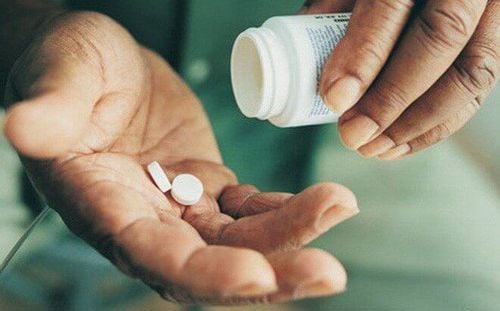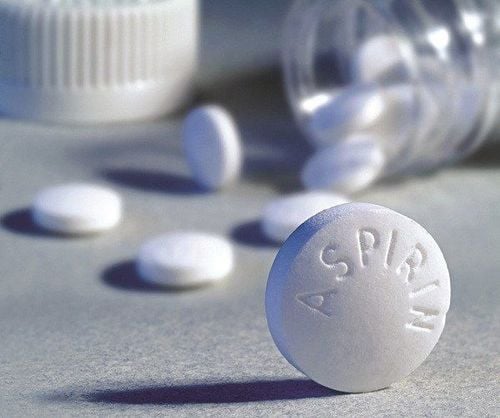This is an automatically translated article.
Platilog is sold under the brand name Plavix, which is on the World Health Organization's list of essential medicines. This is an antiplatelet medicine used to reduce the risk of heart disease and stroke in people at high risk.
1. Uses of the drug Platilog
Platilog has the main ingredient is Clopidogrel bisulfate with the content of 75mg. Belonging to the group of cardiovascular drugs and often indicated for use in the treatment of diseases such as:
Use of drugs in the control and secondary prevention in patients with atherosclerotic disease, stroke, myocardial infarction or diagnosed peripheral artery disease. Primary prevention of thromboembolic atrial fibrillation: Used together with acetylsalicylic acid (ASA, aspirin), to prevent thrombosis after coronary stenting, or as an alternative antiplatelet agent for In patients with aspirin intolerance, symptomatic Carotid stenosis Secondary prevention after coronary artery bypass grafting Percutaneous peripheral angiography in peripheral artery bypass grafting Clopidogrel is indicated to reduce the risk myocardial infarction in a patient with acute non-ST-elevation coronary syndrome (ACS). Clopidogrel is contraindicated in the following cases:
Patients should not use clopidogrel if there is bleeding such as a stomach ulcer or bleeding in the brain. Clopidogrel may increase the risk of bleeding, which is more dangerous than life-threatening. In case the patient has bleeding that does not stop or blood appears in the urine or stool, or if the patient coughs up blood, the nearest medical center should be sought. Talk to your doctor before stopping clopidogrel because it can increase your risk of having a heart attack or stroke. Do not use the drug in patients with hypersensitivity to Clopidogrel bisulfate or any of its ingredients. Do not administer to patients with a history of bleeding such as peptic ulcer or intracranial hemorrhage. Do not use the drug in patients with severe liver failure.
2. Dosage and usage
2.1. How to use The drug is prepared in the form of film-coated tablets and is taken orally, the patient can take the drug with or without food because food does not affect the absorption of the drug.
2.2. Dosage Patients with a history of atherosclerosis apply the dose of 1 tablet (75mg) per day. In the prevention and prevention of thromboembolic disorders such as myocardial infarction, peripheral artery disease and stroke, the drug dosage is 1 tablet (75mg)/day. In the treatment of acute coronary syndromes such as unstable angina and non-Q-wave myocardial infarction, the initial therapeutic dose is 300 mg administered once daily and the maintenance dose is 75 mg once daily. day. In the treatment of non-ST-elevation myocardial infarction (NSTEMI): 300 mg to 600 mg, then 75 mg daily, in combination with aspirin. Patients with STEMI on fibrinolytic therapy: If the patient is 75 years of age or younger, receive a loading dose of 300 mg, followed by 75 mg daily. Duration of treatment for at least 14 days. For patients with kidney failure or the elderly: No need to adjust the dose of the drug, but apply it like a normal patient. Primary prevention of thromboembolism in atrial fibrillation: 75 mg daily. Symptomatic carotid stenosis: 75 mg daily for secondary prevention of coronary artery bypass graft surgery: 75 mg daily. Percutaneous peripheral angioplasty or peripheral artery bypass grafting: 75mg daily. An overdose of Clopidogrel leads to prolonged bleeding time and subsequently bleeding-related complications. Some other manifestations are vomiting, fatigue, shortness of breath, and gastrointestinal bleeding.
Treatment: Treat according to the symptoms that the patient has.
3. Side effects of drugs
Platilog is an easily absorbed drug, but during treatment, patients may still experience unwanted reactions such as:
Common reactions include gastrointestinal disorders with common symptoms such as diarrhea diarrhea, abdominal pain, dyspepsia and nausea and skin allergies manifest as erythema, pruritus. More common reactions such as chest tightness, nosebleeds. More rare reactions include peptic ulceration, thrombocytopenia, gastrointestinal bleeding, severe neutropenia or agranulocytosis, thrombocytopenic purpura, aplastic anemia, loss of taste, acute arthritis, kidney disease such as nephritic syndrome. A more serious reaction is bleeding, which is common in people over 75 years of age, low body weight, or taking medications such as nonsteroidal anti-inflammatory drugs or warfarin can increase the risk of bleeding. .
4. Caution
Use caution when using Platilog in patients experiencing bleeding due to trauma, surgery or other medical conditions. In patients undergoing surgery, clopidogrel should be discontinued at least 5 days prior to surgery. Clopidogrel should be used with caution in patients with lesions accompanied by bleeding symptoms. Platilog should be treated with caution in patients with hepatic impairment. Tell your doctor if you have ever had a stomach or intestinal ulcer, a bleeding disorder or a blood clotting disorder. The drug is safe in these cases. Therefore, patients should only use the drug during pregnancy when absolutely necessary and prescribed by a doctor. Lactation: No studies have shown that clopidogrel is excreted in human milk. Therefore, doctors recommend caution when using Platilog in women who are breastfeeding. During treatment with Platilog, patients should avoid alcohol. It may increase the risk of stomach bleeding. Avoid activities that can cause injury and increase the risk of bleeding. If you intend to use aspirin for pain, fever, swelling, or cold symptoms, consult your doctor before taking it. These 2 medicines taken together can increase the risk of bleeding.
5. Drug interactions
When taken with aspirin, heparin and thrombolytics affect the ability of blood to clot. Naproxen: Co-administration with Platilog increases the possibility of gastrointestinal bleeding. . Abciximab, Acenocoumarol, Acemetacin: The risk or severity of bleeding may be increased when Clopidogrel is combined with the medicines above Abrocitinib: Risk or severity of bleeding and possible thrombocytopenia increased when Clopidogrel was combined with Abrocitinib. Acetylcholine: The risk or severity of adverse events may be increased when Clopidogrel is combined with Acetylcholine Alfentanil: Alfentanil may cause decreased absorption of Clopidogrel resulting in decreased serum concentrations and potentially decreased effective. Alpelisib: The serum concentration of Clopidogrel may be decreased when it is combined with Alpelisib. Amlodipine: The therapeutic efficacy of Clopidogrel may be reduced when used in combination with Amlodipine. Anagrelide: Anagrelide may increase the antiplatelet activity of Clopidogrel Antrafenine: The risk or severity of bleeding may be increased when Antrafenine is combined with Clopidogrel. Apalutami: The serum concentration of Apalutamide can be increased when it is combined with Clopidogrel













